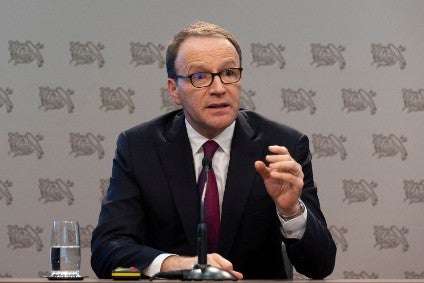
Mark Schneider, the CEO of Nestlé, has admitted the world’s largest food maker has been unable to hit its “normal” production levels during the Covid-19 pandemic.
Speaking to Bloomberg TV, Schneider said the KitKat and Maggi owner had faced issues along the supply chain.

Discover B2B Marketing That Performs
Combine business intelligence and editorial excellence to reach engaged professionals across 36 leading media platforms.
“We’re trying to produce flat out in the face of strong demand but do keep in mind, with logistics limitations now kicking in and also a lower employee presence as a result of illness or precautionary measures, and also an enhanced safety protocol that we need to run at our plants, we’re not always able to give it 100% of the capacity that you would have under normal circumstances,” Schnieder said.
“We’re working extra shifts where we can, we’re trying to ramp up manufacturing where we can but do keep in mind, this is a very, very challenging moment and just getting to the normal levels of manufacturing is a pretty outstanding achievement right now.
“The minute we saw this crisis spread we were trying to improve inventory levels at all levels of manufacturing so input materials, working process, and also finished goods. Obviously there was very little time, and I think flexibility is what’s required right now.
“You do have logistics constraints, sometimes you need to resort to air-freighting, sometimes even that takes longer or capacity is limited. It’s really all about managing, in a very tight knit way, this crisis and ensuring flexibility and this is what our teams are focused on right now.”

US Tariffs are shifting - will you react or anticipate?
Don’t let policy changes catch you off guard. Stay proactive with real-time data and expert analysis.
By GlobalDataAsked how he saw the coronavirus crisis affecting consumer behaviour in the long term, Schneider said Nestlé’s focus remained on shorter-term issues but he gave an indication of what the company is seeing in China
“I think long term it’s probably a bit far out right now. We’re very, very short-term focused at the moment to really meet demand where we can. I think this is the most essential service that we can provide to our consumers,” he said.
“What we’re seeing from China, for example, where there’s some improvement here, that even in the aftermath, that there’s strong demand for value products and quality products, maybe a bit less on premium and, given that we’re of course in a recessionary environment right now, I think that’s also a safe bet then for some of the other communities, as we emerge from the immediate healthcare crisis.”





